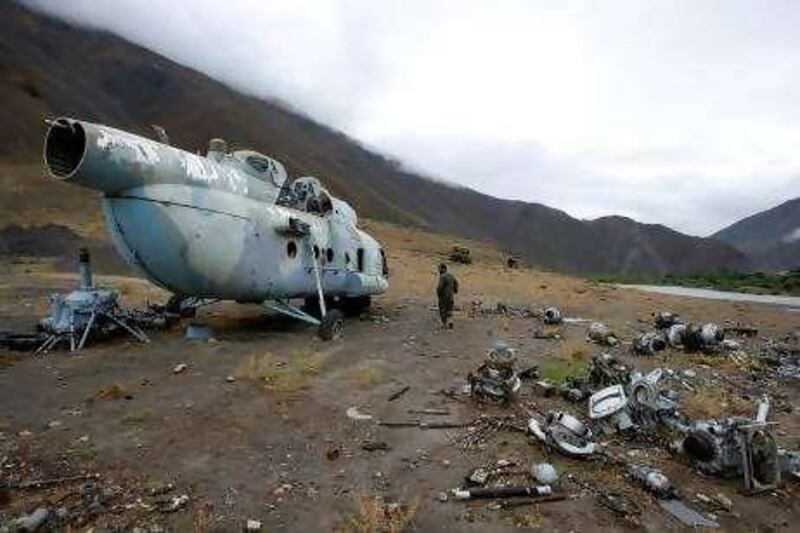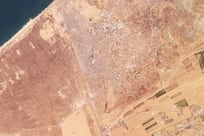PANJSHIR // Not so long ago, Karim Ullah Khan's bitter enemies appeared to have been handed a crushing defeat they could never recover from. Now the Taliban is again closing in on power and the old Northern Alliance member fears there is no peace deal that can save him or any other person in this part of Afghanistan.
"We are very sure that if they come back they will not leave one man in Panjshir alive. If we don't fight they will kill us, so if we fight we will at least die with glory," he said. After years of increasingly bloody conflict between the Taliban-led resistance and Nato and US troops, a growing consensus has emerged that some kind of political solution will be needed to stop this war. In June, tribal elders and religious leaders convened in Kabul to agree on a framework for reconciliation with the rebels. This was later endorsed at an international conference in the capital, which also formally approved plans for Afghan forces to take responsibility for security by the end of 2014.
There is now a widespread expectation the militants will eventually make an official return, either through talking or the gun. However, for many people who once struggled long and hard against the Taliban regime, the idea of any deal is tantamount to betrayal. Nowhere is this more evident than in Panjshir. A beautiful part of the country surrounded by high mountains and with few easy access routes, this province north of Kabul is a natural fortress that has long been hostile to outsiders.
The home of the legendary late mujahideen commander Ahmad Shah Massoud, it was the scene of fierce fighting between Soviet forces and his men in the 1980s. Then, when the Taliban seized power, it remained one of the few areas of Afghanistan never captured by their government. Today it is arguably the most peaceful place in the entire country. A small US military reconstruction team is based here, but there are none of the signs of foreign occupation that exist elsewhere.
Even Afghan soldiers are few and far between. Instead, the people like to boast about how they keep their own security. But trouble is edging closer. In neighbouring provinces, the insurgency exists to varying degrees and this summer has been notable for the momentum rebel groups now have in the north, away from their Pashtun heartland. As a result, the minority ethnic Tajiks of Panjshir are starting to worry. The past is never forgotten in Afghanistan and here, in particular, reconciliation appears to be a pipe dream.
Massoud was a constant thorn in the side of the Taliban until he was killed on September 9, 2001, by two al Qa'eda members disguised as journalists. Washington then used his fighters as a proxy army during the US-led invasion, lavishing them with money and air support as they captured Kabul. Those who knew him say he would never have accepted the Taliban's return to power and they have vowed to defend his memory.
Mr Khan is among them. Having been two years behind Massoud at school, he went on to organise the finances of the mujahideen in Panjshir during the jihad against Soviet occupation, distributing funds to the various militias as and when they needed them. When the Taliban emerged in the mid-1990s, he said there was also talk about a peace deal between the warring factions. But in an echo of their current defiance, he claimed they were convinced of victory and refused any settlement.
"They said, 'We will establish our government and fight anyone who stands against us'," Mr Khan recalled. They give a similar answer when asked about joining the political process now, formally rejecting all offers of reconciliation unless international forces leave the country. They have also demanded that the constitution is changed and a stricter version of Sharia law reintroduced. Afghan President Hamid Karzai has made a number of overtures to the rebels. In the spring he met representatives of another insurgent group, Hizb-e-Islami, and earlier this summer he was rumoured to have held talks with Sirajuddin Haqqani, a senior militant commander.
The main objection people in Panjshir have to all this is centred on their suspicion the Taliban is a tool of Pakistan. It is a theory that can be heard again and again here, with many also believing that the UK and the US are part of the conspiracy. The Taliban's re-emergence and the controversy it is already creating among Afghans has inevitably led to fears that old sectarian divisions could reopen.
While Mr Massoud's memory is used as a rallying cry for freedom in much of the north, elsewhere it is associated with the civil war that destroyed the country in the early and mid-1990s - when he served as defence minister. Salaruddin Haidari is another of his loyal followers in Panjshir. As deputy commander of a brigade of about 560 men who resisted the Taliban regime, he is loath to consider the possibility of his old enemy emerging victorious now.
"If they return to power by force or negotiation, we will be against them. If we don't have the ability to fight them with weapons, we will have hatred in our hearts for them," he said. "If Massoud were still alive, we would not have seen this kind of situation," he added. "If it had turned out like now, he would fight." csands@thenational.ae





